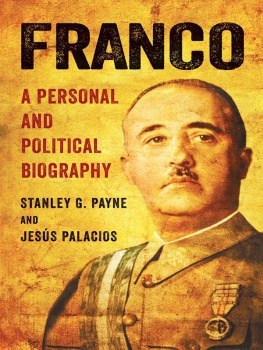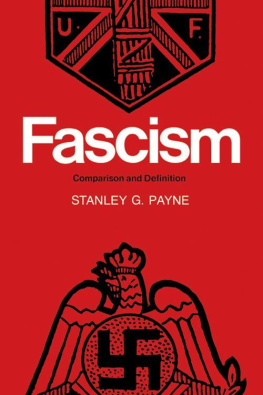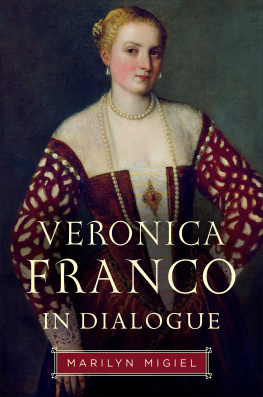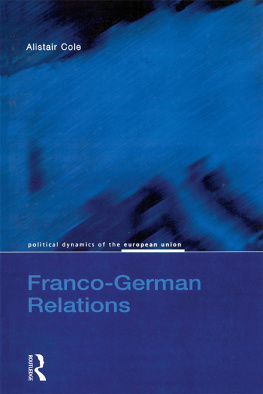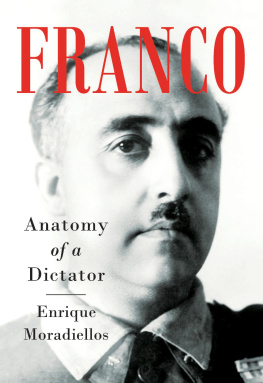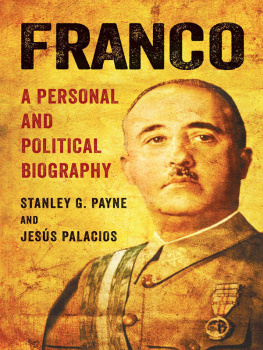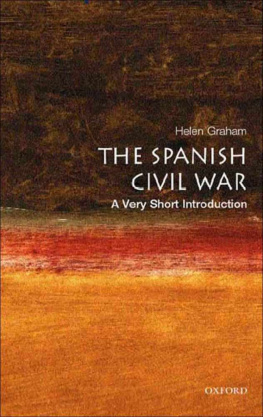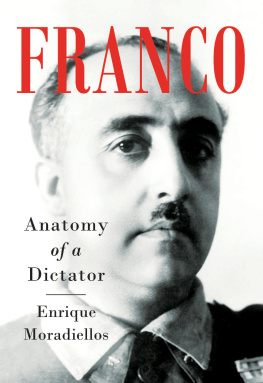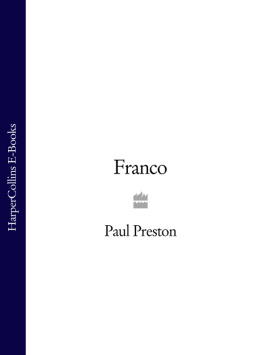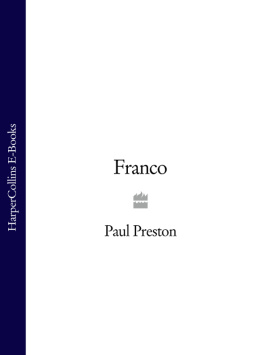Franco
A Personal and
Political Biography

Stanley G. Payne
and
Jess Palacios
THE UNIVERSITY OF WISCONSIN PRESS
The University of Wisconsin Press
1930 Monroe Street, 3rd Floor
Madison, Wisconsin 53711-2059
uwpress.wisc.edu
3 Henrietta Street, Covent Garden
London WC2E 8LU, United Kingdom
eurospanbookstore.com
Copyright 2014
The Board of Regents of the University of Wisconsin System
All rights reserved. Except in the case of brief quotations embedded in critical articles and reviews, no part of this publication may be reproduced, stored in a retrieval system, transmitted in any format or by any meansdigital, electronic, mechanical, photocopying, recording, or otherwise or conveyed via the Internet or a website without written permission of the University of Wisconsin Press. Rights inquiries should be directed to .
Printed in the United States of America
Library of Congress Cataloging-in-Publication Data
Payne, Stanley G., author.
Franco: a personal and political biography /
Stanley G. Payne and Jess Palacios.
pages cm
Includes bibliographical references and index.
ISBN 978-0-299-30210-8 (cloth: alk. paper)
ISBN 978-0-299-30213-9 (e-book)
1. Franco, Francisco 18921975.
2. Heads of stateSpainBiography.
3. GeneralsSpainBiography.
4. SpainPolitics and government20th century.
I. Palacios, Jess, 1952, author. II. Title.
DP264.F7P34 2014
946.082092dc23
[B]
2014007458
publication of this history
is supported via a grant from
Figure Foundation
Contents
Illustrations
following page 317
Preface
Even in the second decade of the twenty-first century, nearly forty years after his death, Franco and his lengthy dictatorship have not fully been consigned to history but continue to excite considerable passion, at least among a minority of his fellow countrymen. There are many accounts of Franco, but the most extensive biographies are strongly polarized between extreme positive and negative portraits. The chief expression of the latter is the thousand-page work by Paul Preston (1993), while the two principal hagiographies are the equally lengthy treatments by Ricardo de la Cierva (2000) and Luis Surez Fernndez (2005). The brief portrait by Juan Pablo Fusi (1985) is more balanced, but it amounts to only an introductory essay. Other biographical works are either highly uneven in their treatment or very limited in their source material. Though no definitive work on so complex and polarizing a figure is to be expected, we concluded that the time had come for a new effort at description and analysis, one that would also include a somewhat fuller treatment of the personal life of the Spanish dictator.
A number of new sources have become available, ranging from the documentation of the archive of the Fundacin Nacional Francisco Franco and the personal observations of his daughter, Carmen Franco Polo, Duquesa de Franco, in the interviews that we conducted in January 2008 to extensive material provided by new secondary studies. Both of the authors have worked in this area for some time. Jess Palacios pioneered research in the Franco Archive beginning with Los papeles secretos de Franco (1996), followed by three other books, while Stanley Payne has authored a number of works on the politics and institutions of Francos regime. Julia Sherman provided a careful critical reading of the entire text, improving it in both style and content.
The present work represents an attempt to offer a more rounded account of Francos life, more objective and balanced than either the denunciations or the hagiographies. Our readers can judge if we have added significantly to the understanding of the Franco era in Spanish history.
Franco
1
The Making of a Spanish Officer
(18921913)
M ore ink has been spilled over Francisco Franco than anyone else in Spains long history. Little of this enormous literature is objective, most of it tending toward one extreme or the other. The real Franco is elusive, all the more so since he left few accessible personal papers, despite the fact that he wrote more than a littlea short novel, a memoir of his early military campaigns in Morocco, quite a few journal and newspaper articles (sometimes under a pseudonym), numerous letters, two brief chapters of an autobiography, and a number of speeches. Yet he has left almost nothing that reveals his more intimate life, and nothing that clarifies the crucial moments of his career or how he reached his most important decisions.
If Francos supporters have depicted him as a genius, his denigrators have frequently portrayed him as a mediocrity, a historical figure who was remarkably successful due to a combination of low cunning and mere luck. Neither portrait is convincing. One of his leading biographers, Paul Preston, certainly no friend of the Spanish dictator, has accurately observed that the standard anti-Franco literature has failed to take him seriously enough to understand him.
Sources are abundant for some aspects of Francos life, but scarce to nonexistent on others. He was born on December 4, 1892, in El Ferrol, an important naval base on the green northwestern coast of Spain, in the region of Galicia, which had been the home of the Francos since 1730. The family might be described as upper-middle class, though not affluent; both sides of the family were members of Spains large hidalgo, or petty aristocratic, stratum, and his mothers side had a connection to the titled Galician aristocracy.
In later years the most insistent rumor about his family background would have to do with supposed Jewish ancestry, though there is no specific evidence to support such an allegation. This is so common that if it was the case with Franco, it would be a distinction shared by more than eight million citizens of twentieth-century Spain and would not constitute any sort of unique finding.
Francos father, Nicols Franco Salgado Araujo, was an officer in the naval supply system (intendencia) who eventually reached the rank of intendente general (equivalent to vice admiral) in a purely administrative capacity. He was an unconventional man in a highly conventional profession. In his personal life and views the elder Franco was an eccentric, well-read freethinker, even something of a libertine, none of these things being characteristic of Spanish naval officers. While posted to Manila when he was thirty-three, he seduced and made pregnant Concepcin Puey, the fourteen-year-old daughter of an army officer, and his son, Eugenio Franco Puey, was born in December 1889. In the officer corps of some navies, such an outrage might have cost Nicols Franco his commission at the hands of an honor court, but in the Spanish navy it was hushed up, though he was sent back to the home base in El Ferrol. He was a competent officer who enjoyed respect for the quality of his service on duty, but he was not popular with his peers, who found his personal life too eccentric and deviant.
In El Ferrol he met the twenty-four-year-old Mara del Pilar Bahamonde y Pardo de Lama-Andrade, the pious and attractive daughter of a senior officer in the naval supply corps, similarly descended from several generations of naval officers. She was distantly related to Emilia Pardo Bazn, Spains first important woman novelist. They married in May 1890, five months after the birth of Nicols Francos illegitimate son. If he revealed the fact that he had an illegitimate child to his new bride, which is doubtful, it remained completely unknown to the rest of the family. During the next eight years, the couple had five children. The oldest son, Nicols, was born in 1891, more than a year before his brother Francisco. A daughter, Pilar, was born in 1895 and another son, Ramn, before the close of 1896. The last child and second daughter, Paz, born in 1898, lived only five years, though all the other children enjoyed good health.

